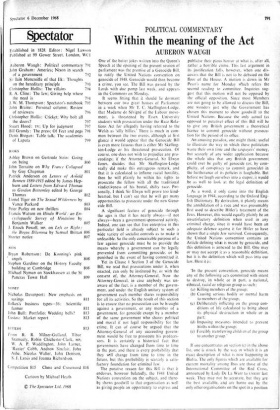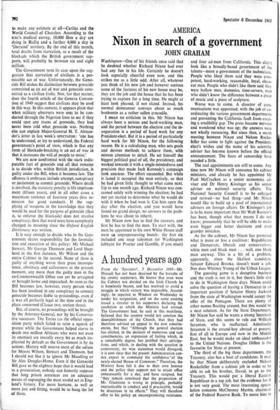Within the meaning of the Act
POLITICAL COMMENTARY AUBERON WAUGH
One of the better jokes written into the Queen's Speech at the opening of the present session of parliament was the promise of a Genocide Bill, to ratify the United Nations convention on genocide of 1948. Genocide would then become
a crime, you see. The Bill was passed by the Lords with due pomp last week, and appears in the Commons on Monday.
It seems fitting that it should lie dormant between our two great houses of Parliament in a week when Mr T. C. Skeffington-Lodge, that Madame de Sdvigne of the Labour move- ment, is threatened by Essex University students with prosecution under the Race Rela- tions Act for allegedly having referred to the Welsh as 'silly billies.' There is. much in com- mon between the two events, although at first glance it would appear that the Genocide Bill is even more fatuous than is either Mr Skeffing- ton-Lodge or his threatened prosecution. Of course, one does not wish to prejudice any pro- ceedings; if the Attorney-General, Sir Elwyn Jones, decides that Mr Skeffington-Lodge really did make this outrageous remark, and that it is calculated to inflame racial hostility, then he will plainly be within his rights to prosecute the fellow with all the traditional vindictiVeness of his brutal, shifty race. Per- sonally, I think Sir Elwyn will prove too kind- hearted, but I can't see that he will get many opportunities to prosecute under the new Geno- cide Bill.
A significant feature of genocide through the ages is that it has nearly always—if not always—been a government-sponsored activity. Indeed, one can see that free enterprise in this particular field is already subject to such a wide variety of socialist controls as to make it unfeasible. So the only conceivable purpose of a law against genocide must be to provide the means whereby a government can be legally prevented from committing genocide, or be punished in the event of having committed it.
Yet in Clause 1 Section 3 of the Genocide Bill, we read that prosecutions under it, when enacted, can only be instituted by, or with the consent of, the Attorney-General. Now the Attorney-General, in case anybody was un- aware of the fact, is a member of the govern- ment, and under the English unitary system of government each member shares responsibility for all its activities. So the result of this section is to ensure that no prosecution can be brought against a government, or any member of a government, for genocide except by a member of the same government who shares political and moral if not legal responsibility for the crime. It can of course be argued that the Attorney-General of any succeeding govern- ment would be free to prosecute his predeces- sors. It is certainly a historical fact that governments have changed from time to time in the past, and there is every probability that they will change from time to time in the future, but this probability is scarcely a satis- factory foundation for criminal law.
The putative reason for this Bill is that it endorses, however belatedly, the 1948 United Nations convention on the subject, and there- by shows goodwill to that organisation as well as giving people an opportunity to express and
publicise their pious horror at what is, after all, rather a horrible crime. This last argument in its justification falls, however, when one dis- covers that the Bill is not to be debated on the floor of the House. A motion is down in Mr Peart's name for Monday Which refers the second reading to committee. Inquiries sug- gest that this motion will not be opposed by the official opposition. Since most Members are not going to be allowed to discuss the Bill, one wonders just why the Government has chosen this moment to show goodwill to the United Nations. Because the only actual (as opposed to putative) effect of this Bill will be to give any British government a theoretical licence to commit genocide without prosecu- tion for the period of its office.
An amusing paradox, one might think; useful to illustrate the way in which these politicians waste their own time and the taxpayers' money, but scarcely of any wider application because the whole idea that any British government could ever be guilty of genocide (or, by com- plicity, of conspiracy to commit genocide). in the furtherance of its policies is laughable. But before we laugh ourselves into a stupor, it would be as well to look at the legal definition of genocide.
As a word, it only came into the English language in 1944, according to the Oxford Eng- lish Dictionary. By derivation, it plainly means the annihilation of a race and was presumably first used to describe Hitler's treatment of the Jews. However, this would equally plainly be an unsatisfactory definition when used in any criminal charge, since it would have been an adequate defence against it for Hitler to have shown that a single Jew survived. Consequently, the United Nations convention contains an Article defining what is meant by genocide, and this definition is annexed to the Bill. One May or may not accept it as a reasonable definition, but it is the definition which will pass into our law. Here it is:
'In the present convention, genocide means any of the following acts committed with intent to destroy, in whole or in part, a national, ethnical, racial or religious group as such: (a) Killing members of the group; (b) Causing serious bodily or mental harm ' to members of the group; (c) Deliberately inflicting on the group con- ditions of life calculated to bring about its physical destruction in whole or in part; (d) Imposing measures intended to prevent births within the group; (e) Forcibly transferring children of the group to another group.'
If one concentrates on section (c) in the above list, one is struck by the way in which it is an exact description of what is now happening in Biafra. The only figures which are available for current mortality among lbos are those of the International Committee of the Red Cross, announced by Lady De La Warr to UNICEF last week. They may not be accurate, but they are the best available, and are borne out by the only other organisations on the spot in a position to make any estimate at all—Caritas and the World Council of Churches. According to the 1CRC'S medical survey, 10,000 Ibos a day are dying in Biafra and a further 4,000 a day in 'liberated' territory. By the end of this month, total deaths from Starvation, as a result of the blockade which the British government sup- ports, will probably be between six and eight million.
The Government rests its case upon the sug- gestion that starvation of civilians is a per- missible act of war. Unfortunately, the Geno- cide Bill makes no distinction between genocide committed as an act of war and genocide com- mitted as a civilian frolic. Nor, for that matter, does the fourth article of the Geneva Conven- tion of 1949 suggest that civilians may be used in this way. In this context, it appears plain that when military observers were sent to be con- ducted through the Nigerian lines to see if they could spot any traces of genocide, they had never been told what genocide was. Nothing else can explain Major-General H. T. Alexan- der's letter in last week's SPECTATOR: 'one has to understand, or try to understand, the Federal government's point of view, which is that any form of blockade-breaking is an act of war in that it increases the will of people to resist.'
We are now confronted with the stark indis- putable fact of genocide and all that remains is to decide who, within British jurisdiction, is guilty under the Bill, when it becomes law. The offences it embraces include attempt, conspiracy or incitement to commit genocide. Where death is involved, the statutory penalty is life imprison- ment (fifteen years), and in all other cases a maximum sentence of fourteen years (less re- mission for good conduct). If the sup- plying of weapons in the knowledge that they would be used for the purpose of genocide (that is, to enforce the blockade) does not involve conspiracy, then that word must have completely changed its meaning since the Oxford English Dictionary was written.
It is easy enough to decide who in the Gov- ernment shares responsibility for the formula- tion and execution of this policy: Mr Michael Stewart, Mr George Thomson and Lord Shep- herd in the first instance, Mr Wilson and the entire Cabinet in the second. None of these is guilty of anything worse than gross incompe- tence, obstinacy and callousness at the present moment, any more than the guilty men in the ex-Commonwealth Office can yet be arraigned or brought home and impeached. As soon as the Bill becomes law, however, every person who has been involved in any conspiracy to commit genocide becomes liable to proceedings, even if it was all perfectly legal at the time and in the place concerned (Clause two, section three).
But, of course, no proceedings will be brought by the Attorney-General, nor by his Conserva- tive successor. The Tories (as the official oppo- sition party which failed to raise a squeak of protest while the Government helped starve to death two million Africans who were not even its enemies) are morally every bit as much im- plicated by default as the Government is by its actions. History will reserve most of the odium for Messrs Wilson, Stewart and Thomson, but I should not like it to ignore Mr Maudling or Sir Alec Douglas-Home. Even if the Genocide Bill gave us the slightest hope that it would lead to a prosecution, nobody can honestly suppose that long prison sentences are an adequate means of expunging the most sordid act in Eng- land's history. Far more humane, as well as more just and fitting, would be to hang the lot of them.



































 Previous page
Previous page